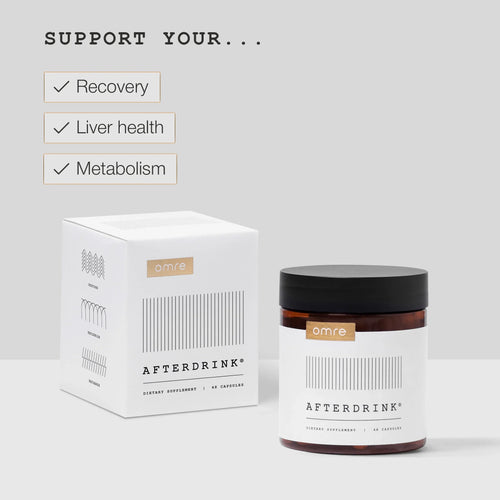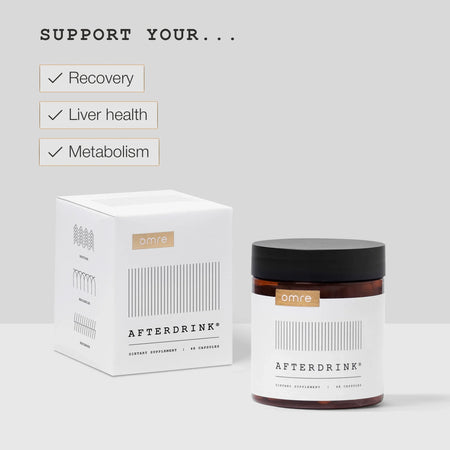Table of Contents
Have you ever experienced a delayed hangover before? When you wake up after a night of drinking, feeling fine, then a few hours later come crashing down.
Sound familiar?
Well, you’re not alone. Delayed hangovers are more common than you think and there are a few different reasons why you may get them.
In this article, we’re going to take a closer look at why you may experience a delayed hangover and everything you can do to get rid of it.
Afterdrink®
A supercharged antioxidant designed to support recovery, made from the very best, research-backed ingredients on the market.*
What is a delayed hangover?
A delayed hangover, or "delayed onset hangover," occurs when hangover symptoms appear several hours after drinking. Initially, you may feel fine, but symptoms like fatigue, headache, and nausea emerge later as your body processes alcohol toxins and recovers from the effects of drinking.
Why does my hangover get worse throughout the day?
Hangovers can worsen throughout the day due to delayed effects of dehydration, disrupted sleep, and lingering alcohol metabolites. Alcohol depletes essential nutrients, irritates the stomach lining, and affects brain chemistry, leading to cumulative symptoms such as headaches, fatigue, and nausea as the body processes toxins.
What are the symptoms of a delayed hangover?
Symptoms of delayed hangovers may include:
Fatigue and weakness
Headaches and muscle aches
Dizziness or a sense of the room spinning
Shakiness
Next up, we’ll look at all the reasons why you may have a delayed hangover.
Why do some hangovers start later in the day?
So, now on to the all-important question. Why do some hangovers start later in the day?
For some, the delayed hangover may occur a few hours after you wake up. For others, it could be well into the afternoon.
Most of the reasons for your delayed hangover can be explained by the following reasons:
– How much you drank the night before.
– When you stopped drinking alcohol.
– How much sleep you’ve had.
– Whether you've had anything to eat.
– Your choice of alcoholic beverage.
Depending on your own personal circumstances, the reason for your delayed hangover will usually be as a result of a combination of the above factors.
We’ve listed the most common reasons for a delayed hangover below:
1) You’re still drunk
By far the most common reason for a delayed hangover is that you’re still drunk in the morning.
Hangover symptoms start when your blood alcohol concentrations reach close to zero. That means, if you’ve still got a decent amount of alcohol in your system, you won’t normally start to feel the symptoms of a hangover.(1)
If you’ve been drinking late into the night, you’ve got a good chance that you still have alcohol in your bloodstream. The reason is, alcohol is metabolized (broken down) by your liver at a set rate.
Although rates vary widely between different people, the “average” capacity of your liver to remove alcohol from your bloodstream is about 7 g/hr in a 155lb (70kg) person. This translates to about one drink per hour.(2)
And one drink is defined as, a single shot of 40% spirit. Or in other words, just under half a pint of beer or a small glass of wine.
That means, if you’ve had 4 double vodka sodas last night, it can take up to 8 hours for your liver to clear the alcohol from your bloodstream.
So, if you’ve been drinking late into the night, and then wake up relatively early, the chances are you’re still drunk!
And that explains why you may experience a delayed hangover that starts in the afternoon as opposed to when you wake up.
You can read a more detailed review of this in our article about how long alcohol stays in your system.
2) Low blood sugar
Ever felt that your hangover starts after you’ve eaten in the morning?
This type of delayed hangover could be a result of fluctuations in your hormonal system. Namely, the control of your blood sugar and insulin levels.
After a night out, If you count up the number of hours since your last meal, it's probably a long time. Essentially, your body is in a fasted state. In addition to this, binge drinking alcohol is well-known to drop your blood sugar as well.(3)
So, when you wake up in the morning and have a big meal, your blood sugar levels rise rapidly. At the same time, your insulin levels spike as well which in turn initiates rapid glucose uptake by your cells and a period of subsequent sugar crash. This is known as “post-prandial” or “reactive” hypoglycemia.(4)
This yo-yo effect on your insulin regulatory systems can wreak havoc on your insides. Many of the symptoms are very similar to a hangover including, dizziness, irritability, brain fog, and light-headedness.
Delayed hangover headache
For some people, the main delayed hangover symptom is a headache. The triggers for headaches vary greatly between individuals. Also, there are many different types of headaches such as tension, migraine, and cranial neuralgias to name a few.
Aside from the fact that alcohol is a trigger for headache itself, dehydration is another common cause. And the dehydrating action of alcohol can continue well into your morning if alcohol is still in your bloodstream.
In this case, your hangover headache may be delayed until later in your day. You can read more about this in our article on hangover headaches.
Delayed hangover after 24 hours
A hangover that seems delayed for 24 hours might be due to factors like prolonged dehydration, slow alcohol breakdown, or the lingering effects of poor sleep and nutrient depletion. Drinking large amounts of alcohol, failing to stay hydrated, or individual differences in how your body processes alcohol can all play a role in extending hangover symptoms into the next day.
If you feel like your hangovers are delayed by more than 24 hours, you might wake up feeling fine after a night out but feel unwell the following day. While extended hangover symptoms can happen, it’s rare to have a full day of feeling normal before they appear.
This delay could point to other causes, as hangover symptoms like fatigue, headache, and nausea often overlap with conditions like the flu. To help your body recover, hydrate, rest, and eat well. If symptoms persist, consult a doctor for advice.
Afterdrink®
A supercharged antioxidant designed to support recovery, made from the very best, research-backed ingredients on the market.*
How to deal with a delayed hangover
So, you’ve been unfortunate enough to have a hangover that’s hit you all of sudden in the afternoon. What now?
The same principles you’d follow if you’d had a normal hangover still apply. By that we mean the following:
1) Rehydration: Aside from plain old water, you could try rehydration mixes in order to hydrate faster. Rehydration mixes provide an ideal balance of electrolytes and sugar to support rapid hydration.
2) Painkillers: acetaminophen and ibuprofen are the go-to options. Just be aware that these medicines can make you feel nauseous if your stomach is unsettled.
3) Nap: the best “hangover remedy” is sleep. More often than not, your body just needs a little more time to reset itself.
4) Food: eat smaller portions and stick to food that’s easy to digest like plain carbohydrates. Meaning, pasta, rice, and potatoes.
Anything else to consider?
Any hangover, including a delayed hangover, is a sign from your body that you’ve been drinking too much for your body to handle. Drinking late into the night and not having enough rest or water wreaks havoc on your insides.
Setting yourself a limit with regards to when you plan to have your last drink is a good way to avoid drinking into the early hours of the morning.
If you do have late-night drinking, be wary of whether you’re still drunk in the morning. If not “drunk”, you may very well still have a significant amount of alcohol in your bloodstream. Clearly, that can be dangerous if you need to drive or go to work.
If in doubt, just stay at home and give yourself some more time to recover. It’s never worth the risk.
Delayed hangovers – Conclusion
That brings us to the end of our look into delayed hangovers.
We’ve walked you through all the reasons why you may wake up feeling OK in the morning, but a few hours later start to feel the hangover take hold.
In most cases, it’s probably because you’ve had a few too many drinks late into the night and still have alcohol in your system.





